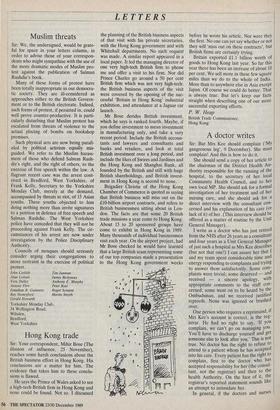Hong Kong trade
Sir: Your correspondent, Mihir Bose (The illusion of influence, 25 November), reaches some harsh conclusions about the British business effort in Hong Kong. His conclusions are a matter for him. The evidence that takes him to these conclu- sions is flawed.
He says the Prince of Wales asked to see a high-tech British firm in Hong Kong and none could be found. Not so. I discussed the planning of the British business aspects of that visit with his private secretaries, with the Hong Kong government and with Whitehall departments. No such request was made. A similar report appeared in a local paper. It led the managing director of one very high-tech British firm to phone me and offer a visit to his firm. Nor did Prince Charles go around a 50 per cent British firm which was not very high-tech: the British business aspects of the visit were covered by the opening of the suc- cessful 'Britain in Hong Kong' industrial exhibition, and attendance at a Jaguar car launch.
Mr Bose derides British investment, which he says is ranked fourth. Maybe, if you define investment to mean investment in manufacturing only, and take a very recent period. Include the British accoun- tants and lawyers and consultants and banks and retailers, and look at total British investment over a Jong period, and include the likes of Swires and Jardines and the Hong Kong and Shanghai Bank, all founded by the British and still with huge British shareholdings, and British invest- ment in Hong Kong is second to none.
Brigadier Christie of the Hong Kong Chamber of Commerce is quoted as saying that British business will miss out on the £10-billion airport contracts, and refers to British businessmen sitting about in Lon- don. The facts are that some 20 British trade missions a year come to Hong Kong. About 15 to 20 sponsored groups have come to exhibit in Hong Kong in 1989. Many thousands of individual businessmen visit each year. On the airport project, had Mr Bose checked he would have learned that a large British team representing some of our top companies made a presentation to the Hong Kong government weeks before he wrote his article. Nor were they the first. No one can yet say whether or not they will 'miss out on these contracts', but British firms are certainly trying. Britain exported £1.1 billion worth of goods to Hong Kong last year. So far this year there has been an increase of about 10 per cent. We sell more in these few square miles than we do to the whole of India. More than to anywhere else in Asia except Japan. Of course we could do better. That is always true. But let's keep our facts straight when describing one of our more successful exporting efforts.
P. W. Heap
British Trade Commissioner, Hong Kong










































































































 Previous page
Previous page